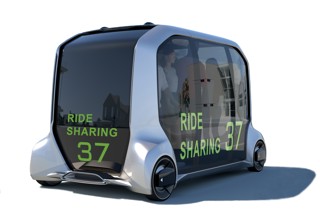The future of mobility and last mile deliveries are the subject of two Government consultations launched today.
The Last Mile call for evidence aims to improve the Government’s understanding of the scale of opportunity, as well as some of the current barriers to delivering goods more sustainably.
It will explore how electrically powered e-vans, micro vehicles and e-cargo bikes can provide better service to customers for cargo in comparison to light commercial vehicles; the scale of the potential environmental and other benefits; and the barriers to sustainable last mile delivery.
Furthermore, it will examine what incentives might be appropriate to encourage a large-scale shift to clean, last-mile delivery options and measures to improve logistical efficiency (eg urban consolidation centres/hubs).
The Future of Mobility call for evidence is split into two main parts.
Part one seeks views and evidence to inform the Government’s Future of Urban Mobility Strategy. It is split into three sections: the background against which changes to transport are occurring; assessment of the emerging trends that will shape urban mobility in the next couple of decades; and consideration of the approach Government should take to help cities harness the opportunities and address any challenges presented by these trends.
Part two looks at how best Government can support innovation across the country, with a focus on: ‘mission-oriented’ policy-making; ensuring a regulatory framework that evolves with the times; and resolving barriers to data sharing and use.
The call for evidence, says the Government, fires the starting gun on the Future of Mobility Grand Challenge, which aims to make the UK the world leaders in the movement of goods, services and people.
The work is part of the Government’s Industrial Strategy, which aims to help reduce greenhouse gas emissions, make travel safer, improve accessibility, and present enormous economic opportunities for the UK.
As part of this, the Government also confirmed today £12.1 million of funding for six projects working on simulation and modelling to aid the development of connected and autonomous vehicles. The capability will be essential for developing, testing and proving the safety of the vehicles, it said.
Transport minister Jesse Norman explained: “The UK has a long and proud history of leading the world in transport innovation and our Future of Mobility Grand Challenge is designed to ensure this continues.
“We are on the cusp of an exciting and profound change in how people, goods and services move around the country which is set to be driven by extraordinary innovation. This could bring significant benefits to people right across the country and presents enormous economic opportunities for the UK, with autonomous vehicles sales set to be worth up to £52 billion by 2035.
“Our Last Mile call for evidence and Future of Mobility call for evidence mark just one stage in our push to make the most of these inviting opportunities.”
Today’s publication of the Last Mile and Future of Mobility calls for evidence precedes a full Future of Urban Mobility Strategy, which is due to be published by the end of the year.
The Government has appointed Ian Robertson, BMW UK chief executive, as ‘Business Champion’ to help advise, shape and develop the Future of Mobility Grand Challenge.
He will be supported by an advisory council made up of Isobel Dedring, Tracy Westall and Stan Boland.
Robertson said: “A transport revolution in the way people and goods move around will see more changes in the next 10 years than the previous hundred.
“As the Future of Mobility Grand Challenge Business Champion, I’m looking forward to working with the government to help the UK build on its existing strengths and capitalise on that opportunity.”























Login to comment
Comments
No comments have been made yet.